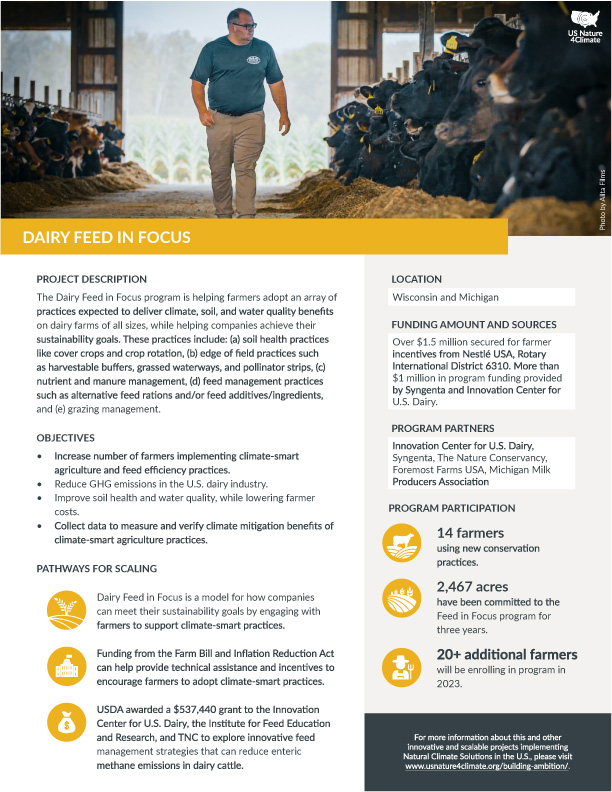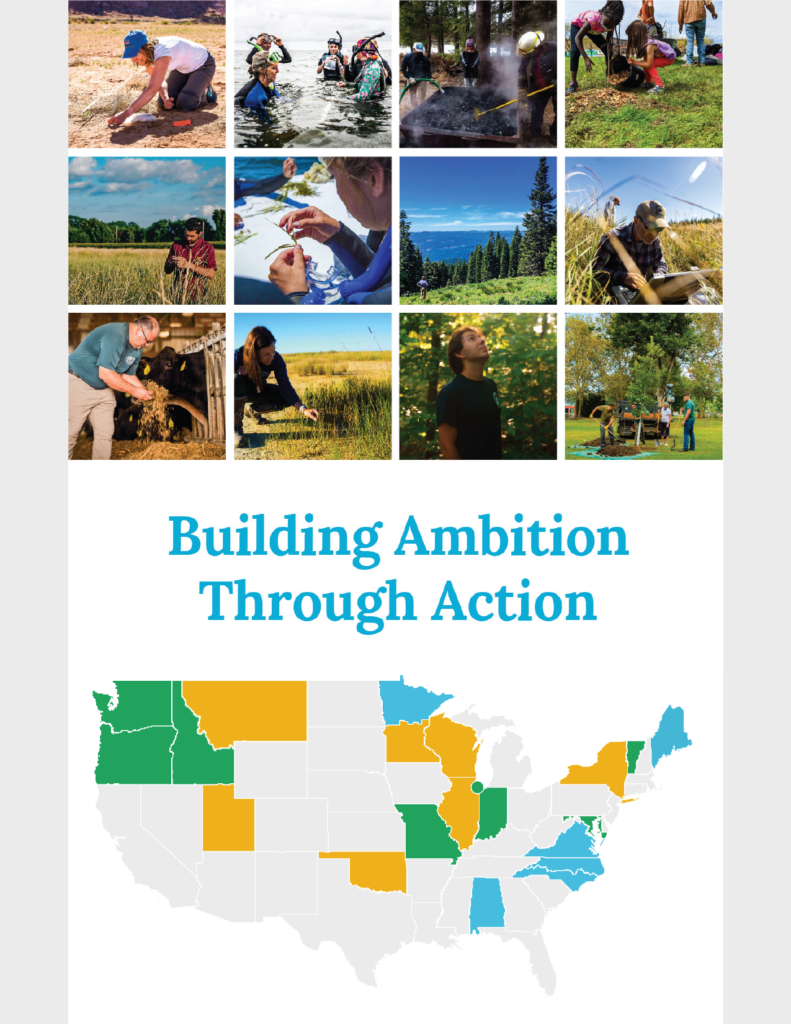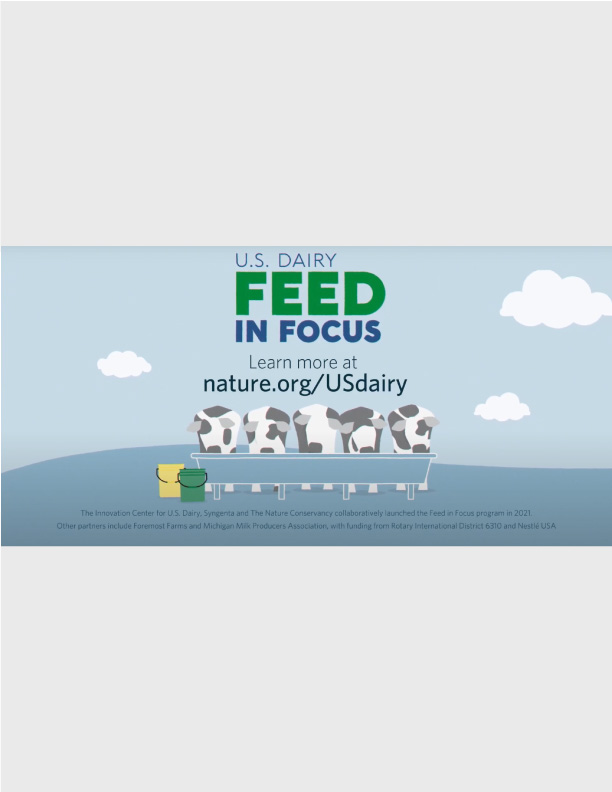Last updated on March 11th, 2024

Cheese, yogurt, butter… dairy is a long-time diet staple and integral to a vast number of food cultures worldwide. In the United States, dairy consumption has been on the rise for decades, while the number of U.S. dairy farms has steadily declined. Today, there are fewer than 30,000 U.S. dairy farms, and each has an opportunity to drive climate solutions within their operation.
The dairy industry has a long-standing commitment to sustainability. In fact, thanks to improved farming practices the carbon footprint of producing 1 gallon of milk shrank by 19% between 2007 and 2017, requiring 30% less water and 21% less land, according to a study published in the Journal of Animal Science. But there is still more work ahead. While growing crops for cow feed contributes to a dairy farm’s environmental footprint, most of an operation’s greenhouse gas (GHG) emissions is methane from cow burps and methane and nitrous oxide from manure.

With impact, comes opportunity.
The Innovation Center for U.S. Dairy has set aggressive environmental stewardship goals—including achieving greenhouse gas neutrality by 2050. To reach these goals, six national dairy organizations came together to form the U.S. Dairy Net Zero Initiative (NZI), an industry-wide collaboration to advance research and technology, on-farm pilots, and new market development. The objective is to make sustainable practices and technologies more accessible and affordable to all U.S. dairy farms.
Farmers like Theo Scholze in Wisconsin are ready to do their part. “Just about every decision we make, there is a financial side to it,” he says. “But if I can make changes to help the overall global environment, I feel it is my responsibility to do that.”

Scholze is among the first farmers to enroll in the Dairy Feed in Focus program, a collaboration launched by the Innovation Center for U.S. Dairy, Syngenta and The Nature Conservancy (TNC). The program supports NZI’s environmental objectives by helping to incentivize and implement best practices in feed and forage production and feed efficiency.
Since farmer recruitment began in Michigan and Wisconsin in 2022, TNC has worked with Foremost Farms and Michigan Milk Producers Association to enroll over 30 farmers and approximately 10,000 acres. These farms represent a total influence of over 42,000 acres and 23,000 dairy cows. Farmer recruitment for 2024 is slated to start in September 2023. The program is helping farmers adopt an array of practices expected to deliver climate, soil, and water quality benefits on dairy farms of all sizes. These practices include:
- Soil health practices like cover crops, reduced/no till, and crop rotation
- Edge of field practices such as harvestable buffers, grassed waterways, and pollinator strips
- Nutrient and manure management
- Feed management practices such as alternative feed rations and/or feed additives/ingredients
- Grazing management
The minimum time commitment for farmers to implement practices on their farms is three years. Farmers also receive incentive payments for practice implementation. To date, the FiF team has fundraised over $1.5M for farmer incentives in Michigan, Wisconsin, and Idaho. Nestlé USA is funding the incentives in all three states, and Rotary International District 6310 is funding the incentives for several farms in Michigan.
Additional elements of the climate-smart Feed in Focus program include working with the farmer to collect data, and then track and analyze that data for sustainability metrics like reduction of GHG emissions. Program partners also provide tailored technical support for decision making, implementation, monitoring, reporting and verification.

Participating farmers, like Scholze, are pioneering a new phase of dairy farming. They are helping to create scientifically verified examples of the best agronomic and farm management practices that will serve as models for practice implementation on dairy farms of all sizes through the U.S. and beyond.
“Scalability is key to drive meaningful change and impact,” said Liz Hunt, Head of Sustainable and Responsible Business for Syngenta North America. “Our expectation is this project will deliver a blueprint for how to implement similar projects across the country, promoting shared learnings that benefit supply chains across the dairy industry.”
Throughout their broad networks, program partners will share these success stories with U.S. dairy farmers and help accelerate adoption of practices that improve productivity and reduce the industry’s environmental footprint.
But the collaboration between the dairy industry and conservation does not stop with the Feed in Focus program. In 2021 the Innovation Center for U.S. Dairy, the Institute for Feed Education and Research, and TNC were awarded a $537,440 grant by the U.S Department of Agriculture to explore innovative feed management strategies that can reduce enteric methane emissions in dairy cattle. This project, along with the Feed in Focus program, are examples of how government, businesses and NGOs can work together to advance climate-smart agriculture practices for the benefit of farmers, communities and nature.
“If we all contribute a little bit, we can move in a direction that is positive for the environment and positive for our industry,” says Scholze.

Last edited on August 1, 2023.
Karen Scanlon is the Executive VP of Environmental Stewardship at Innovation Center for U.S. Dairy.
Alisha Staggs is the North America Dairy Program Director at The Nature Conservancy.



